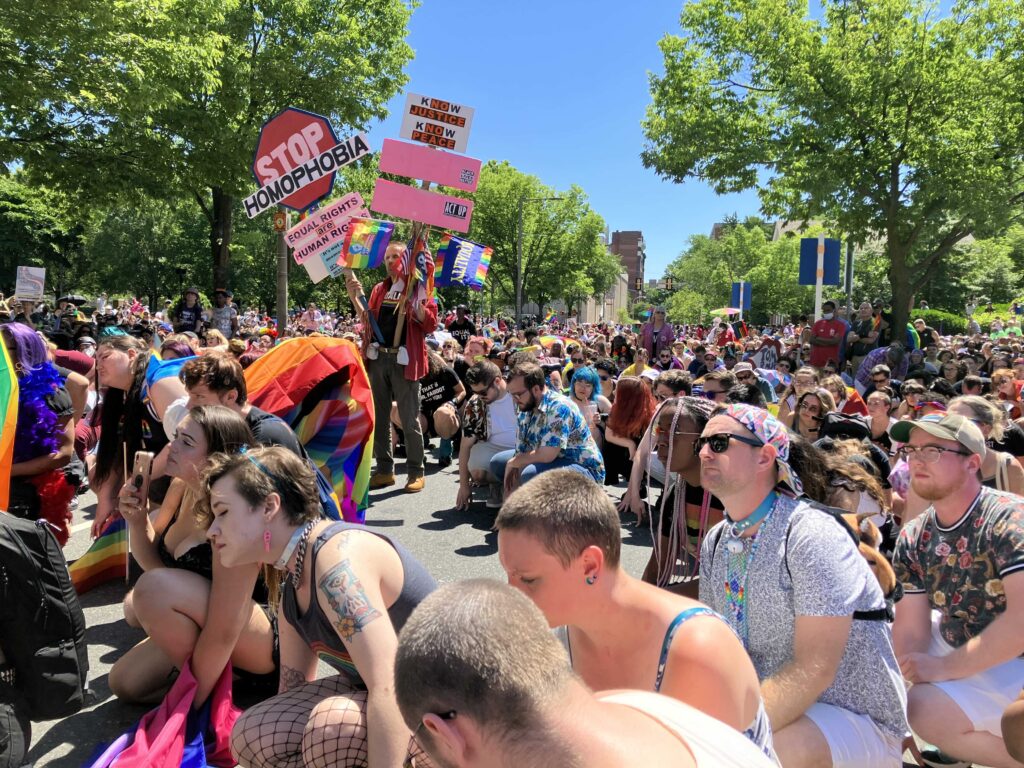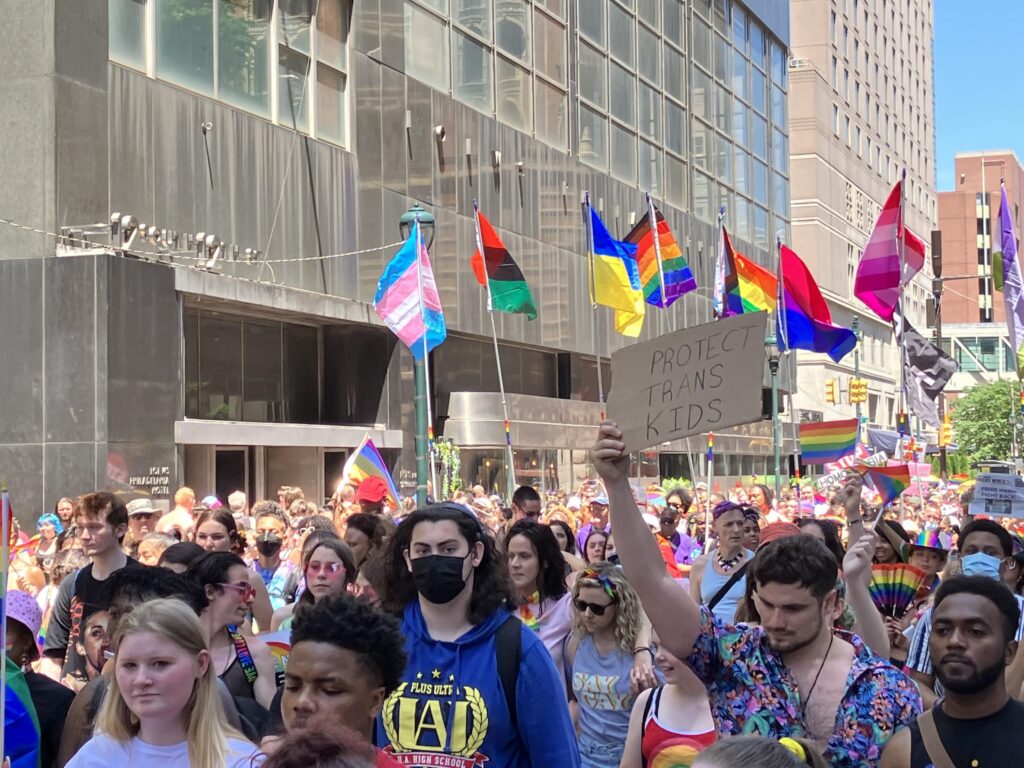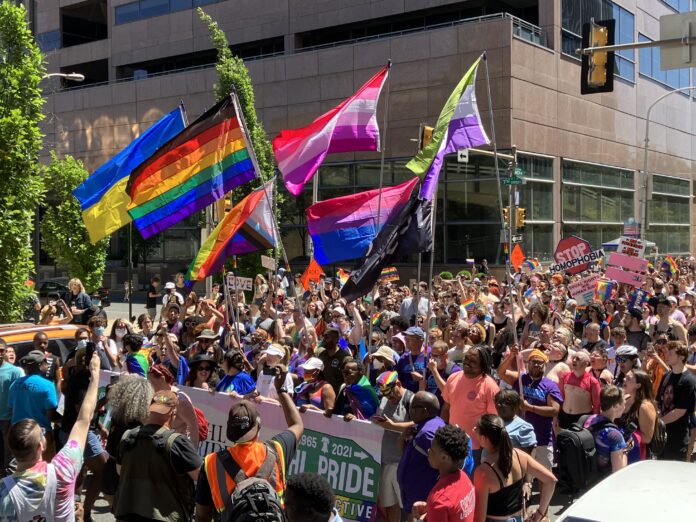Nearly three years since its last in-person Pride celebration and knee deep in the nationwide legislative attacks on the LGBTQ community, Philadelphia Pride began this year with a march. Participants gathered June 5 in front of the Constitution Center at 5th and Arch Streets with very little of the typical costumes and pomp seen in parades past. Standing atop the Bearded Ladies Cabaret’s Beardmobile, the march’s emcee, Sam Rise, rallied the crowd that stretched three blocks and looked to number in the thousands.
“Philadelphia, that is a small word,” Rise said. “When we hear the truth, when we hear the reality, when we hear the radical imagination, the vision that we have for a world where all of us are all the way free, when we know that that started thousands and thousands of years ago, when that leadership is in the ground that we walk on is in the sky over our heads and the river behind us is in the hills in front of us, Philadelphia is not a big enough word to encapsulate the beauty and the power, the trans limitlessness that I see in front of me.”
The speaker system was largely able to drown out the half dozen anti-LGBTQ protesters standing at the opposite corner on Arch Street. Still, Rise addressed the hate group, leading the crowd in chanting the words of Marsha P. Johnson: pay it no mind.
“When most people want to make you feel small, when they want to tell you that you deserve nothing, when they want to steal from you your dignity, your equity, your access, the liberation you know is possible, you say to them: pay it no mind. You don’t need to repay them anything.”
The first of several planned moments for speeches took place just before the marchers departed: a land acknowledgement for the Lenni Lenape people.

“My ancestors are buried right here,” Tammy Walkingstick said as march participants knelt and touched the ground. “I support you all. And I love you all. And I want you to know that we need your love back. The indigenous people of Philadelphia are still here. Soon there will be a new establishment here in the city of Philadelphia for the Native American and Indigenous people. And I’m looking forward to every one of you to support us in any way that you can.”
Led by Dykes on Bikes and Queers on Wheels, the marchers then proceeded two blocks up Arch Street to the African American Museum in Philadelphia, the second planned stop for speeches.
Leona Libertad spoke to the audience about the need for members of the queer community to defend one another in the face of discrimination.
“…You don’t get to where we are now if people care, if our leaders care,” Libertad said. “How many people have been dealing with housing crises, how many people are dealing with having to move three and four different times after quarantine, how many people have had to put their their Venmo or their CashApp up online and say ‘look, I know that I’m not making enough money, so I need to ask.’ We are out here by ourselves, everyone. And for queer people, we know that, or at least we should we should be able to remember that and never forget that this government, this legislative system, doesn’t defend us, and that we must be our own community.”
After Libertad spoke, author and activist Mothasistah talked to the crowd about raising a trans child and echoed the notions of protecting one’s family and community
“When my son first told me, ‘mom, you and the doctors got it wrong,’ I believed him, and I followed his lead. But then I got worried… I wasn’t necessarily scared, but I knew, once again, there’s another piece of his identity that’s gonna be purposely targeted for sport. A child. And so now that we’re in this racist, sexist, patriarchal, white supremacist foundations of a country, with its anti-trans prejudice and hating, we still gotta work to protect our own.”

After the stop at the African American Museum, marchers proceeded up Market Street. In addition to private security staff who joined in the march, Philadelphia police officers had an understated, but visible presence along the route, and police cars were stationed throughout to block traffic. The marchers then turned down 12th Street to the final stop near the Gayborhood, where they heard from speakers including Rev. Jeffrey Jordan of the Whosoever Metropolitan Community Church, Jose de Marco, founder of Black and Latinx Community Control of Health, and several LGBTQ youth.
“This is the first Pride that I’ve felt a part of,” de Marco said to the crowd. “The former organizers of Pride would not move the date of Pride so we as Black folks could attend Odunde.” De Marco, an active member of ACT UP Philadelphia, also reminded people about the HIV/AIDS crisis.
“I want everybody to hear that HIV and AIDS is not a thing of the past. It’s disproportionately affecting trans youth and queer Black and Latinx men; it is not over,” De Marco said. “It’s caused by homelessness, addiction, all of the things that no one wants to deal with or talk about. Social injustice is causing HIV infections in our communities, not the lack of condoms. Remember that.”
Following the speeches, marchers dispersed into the Gayborhood for the Pride festival, passing by a printed banner of the former Gloria Casarez mural, which was whitewashed and torn down in December 2020. The festival, which resembled the former OutFest block party, featured nonprofit organizations and small businesses at tables, food and drink vendors, family areas, and performance spaces.
“It is a great honor and it’s a real joy to be out here at this beautiful parade on a gorgeous day,” said march attendee State Sen. Nikil Saval, who represents the Gayborhood in Harrisburg. “I appreciate the joy and exuberance of what we’re all feeling. It is also in the face of a truly concerted set of attacks to roll back and in some ways criminalize who you are and what you stand for. Our own state fails to protect you from discrimination in work places and public accommodation. But I think there’s an attempt to do much more than that, to control what it is people learn in schools, we know there is. I think this is a beautiful sense of what a real picture would look like that is opposed to that – a sense of defiance.”
Both the march and festival were organized by PHL Pride Collective, which formed in June 2021.
